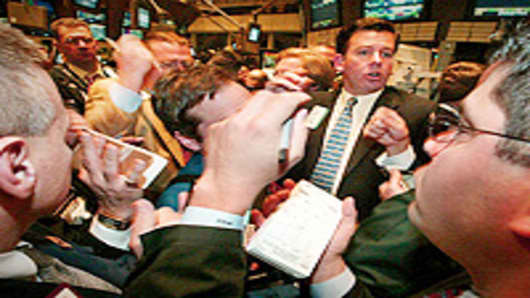After trading in a 1,000-point range for the first time ever, stocks ended Friday with a whimper, closing slightly lower amid hopes that the holiday weekend could bring good news.
The Dow Jones Industrial Averageand the Standard & Poor's 500both finished the day about 1 percent lower, while the tech gauge Nasdaqended slightly positive. The Dow and the S&P closed the week off 18 percent, while the Nasdaq dropped about 13 percent.
"An incredible day, but I wasn't worried," John Lynch, of Evergreen Investments, said on CNBC. "We were clearly in a scary environment there for a while."
But surprisingly strong bank stocks held forth and barred the door from further losses. Optimism also surrounded the meeting of the Group of Seven, or G7, as finance leaders from the world's rich nations pledged a coordinated response to the credit crisis.
At the same time, a steep round of earlier selling seemed to reflect a lack of confidence in the US government's attempts to shore up bank balance sheets and to provide liquidity into the market.
"All of the workings of government to try to not let the credit crisis run its course, the abrogation of free markets, and to not let the deflationary recession run its course is going to be very pernicious for us in the long run," said Michael Pento, senior strategist at Delta Global Advisors. "I do think in the short run the market could get some footing here in the next few weeks to try to make a reasonable recovery from its lows. But I think that will be short-lived."
There were hopes that the market was finding a bottom, with analysts keeping a close eye on volume to tell the capitulation story. Volume seemed to be in line with a market bottom as nearly 3 billion shares traded hands, and turbo-charged price movement marked the day, with the Volatility Index blowing past its previous high and soaring over 75 at one point.
"We're seeing asset classes across the board being sold--commodities, energy, equities, bonds, you name it," Peter Kenny, of Knight Equity Trading, said on CNBC. "Everything is being sold. That's a sure sign that we're reaching some sort of tipping point in the market and market psychology."
Some of the big banking stocks roared towards the end of trading, with Wachovia and JPMorgan Chase leading the charge.


